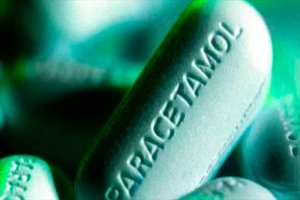- Home
- Editorial
- News
- Practice Guidelines
- Anesthesiology Guidelines
- Cancer Guidelines
- Cardiac Sciences Guidelines
- Critical Care Guidelines
- Dentistry Guidelines
- Dermatology Guidelines
- Diabetes and Endo Guidelines
- Diagnostics Guidelines
- ENT Guidelines
- Featured Practice Guidelines
- Gastroenterology Guidelines
- Geriatrics Guidelines
- Medicine Guidelines
- Nephrology Guidelines
- Neurosciences Guidelines
- Obs and Gynae Guidelines
- Ophthalmology Guidelines
- Orthopaedics Guidelines
- Paediatrics Guidelines
- Psychiatry Guidelines
- Pulmonology Guidelines
- Radiology Guidelines
- Surgery Guidelines
- Urology Guidelines
Blood test to aid paracetamol overdose treatment

People who overdose on paracetamol could be helped by a blood test that shows immediately if they are going to suffer liver damage.
Researchers say the test - which detects levels of specific molecules in blood - will help doctors identify which patients arriving in the hospital need more intense treatment.
It will also help speed the development of new therapies for liver damage by targeting patients most likely to benefit.
The test detects three different molecules in the blood that are associated with liver damage - called miR-122, HMGB1, and FL-K18.
Previous studies have shown that levels of these markers are elevated in patients with liver damage long before current tests can detect a problem.
A team led by the Universities of Edinburgh and Liverpool measured levels of the three markers in more than 1000 patients across the UK who needed hospital treatment for paracetamol overdose.
They found that the test can accurately predict which patients are going to develop liver problems, and who may need to be treated for longer before they are discharged.
The test could also help identify patients who can be safely discharged after treatment, helping to free up hospital beds.
Paracetamol is a relatively safe painkiller when taken at the right dose. Around 50,000 people are admitted to hospital each year in the UK due to overdose, however.
Many people unknowingly consume too much by taking paracetamol at the same time as cold and flu medications that also contain the drug.
Liver injuries are a common complication of drug overdoses. In some cases, the damage can be so severe that the patient needs a transplant and, in rare instances, can be fatal.
Patients with a life-threatening level of paracetamol in their blood can be treated with an antidote called acetylcysteine, given by intravenous drip. The treatment is associated with side effects so doctors do not treat patients longer than necessary.
The researchers say the test could help to pinpoint patients who are unlikely to benefit from treatment.
The study, published in The Lancet Gastroenterology & Hepatology, was funded by the Edinburgh and Lothians Health Foundation and the Medical Research Council.
Dr James Dear, of the University of Edinburgh, said: "Paracetamol overdose is very common and presents a large workload for already over-stretched Emergency Departments. These new blood tests can identify who will develop liver injury as soon as they first arrive at a hospital. This could transform the care of this large, neglected, patient group."
Dr Daniel Antoine, who was based at the University of Liverpool during the study but is now at the University of Edinburgh, said: "This is an excellent example of scientists, clinicians and statisticians working together to tackle an important medical problem. The outcome of studies like these has generated excitement amongst the pharmaceutical industry and drug regulation so that we can further our understanding of the fundamental basis of drug-induced liver injury."

Disclaimer: This site is primarily intended for healthcare professionals. Any content/information on this website does not replace the advice of medical and/or health professionals and should not be construed as medical/diagnostic advice/endorsement or prescription. Use of this site is subject to our terms of use, privacy policy, advertisement policy. © 2020 Minerva Medical Treatment Pvt Ltd